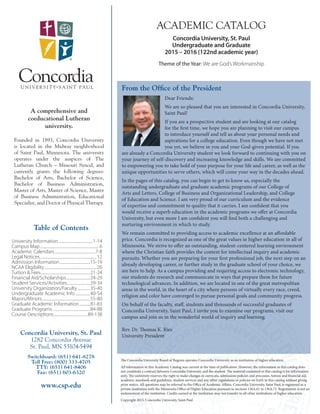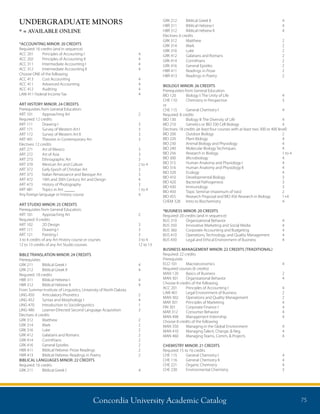The 2015-2016 academic catalog for Concordia University, St. Paul outlines the university's comprehensive educational programs and services offered for both undergraduate and graduate students. It emphasizes the university's Lutheran affiliations, commitment to academic excellence, and opportunities for personal development within a supportive environment. The catalog includes details on admissions, tuition, academic calendars, and various university resources to aid student success.


























































![Concordia University Academic Catalog 59
Prerequisites from General Education
MUS 120 or 121Listening to Life: Western Classical Music/Global and Pop 2
Required: 37credits
MUS 201 Musicianship I 4
MUS 202 Musicianship II 4
MUS 261 Beginning Conducting 2
MUS 301 Musicianship III 4
MUS 302 Musicianship IV 4
MUS 321 Music History I 3
MUS 322 Music History II 3
MUS 323 Music History III 3
MUS 439 Parish Music Field Experience 2
MUS 713 Jubilate (2 semesters required) 0 to 2
THL 460 Worship for Lutherans 3
Choose one course for the Senior Capstone
MUS 492, MUS 493, MUS 494, or MUS 495 2
Electives: 0 to 3 credits to total 48 to 52 for the major
Electives may be chosen from any music offerings. Up to 2 credits may be drawn
from 700-level ensemble courses. Recommended: MUS 430 History of Sacred
Music, and/or MUS 431 Congregational Song
Tracks: Choose one (contact Chair of the Music Department, Dr. David Mennicke,
at [651] 641-8828 or dmennicke@csp.edu)
Choral Track: 10 to 15
Instrumental Track – Guitar: 11 to 15
Instrumental Track – Organ: 10 to 14
Instrumental Track – Piano: 11 to 15
Instrumental Track – Wind, String, Bell, or Percussion: 15
Theory/Composition Track: 10
Required for Director of Parish Music (DPM) Certification:
Lutheran Theology Minor 24
Additional Requirements: Students must attend two recitals or concerts per year
and document such in their Music Portfolio. The Portfolios should be submitted for
review each year by November 1 to the Chair of the Music Department. A minimum
of a 2.5 GPA is required in music coursework.
COMMUNICATION ARTS AND LITERATURE EDUCATION/TEACHING MAJOR
(GRADES 5 –12): 87 CREDITS (BA TRADITIONAL)
Program Overview – Students who complete this major are eligible to apply to the
Minnesota Department of Education for a teaching credential for grades 5 through
12 communication arts and literature. Passage of standardized examinations of
content and pedagogy are also required.
Prerequisites from General Education
COM 103 Interpersonal Communication 4
PSY 101 Introduction to Psychology 4
Required: 45 credits
COM 212 Public Speaking 4
COM 222 Mass Communication 4
ENG 324 Teaching Writing 1:1 2
ENG 330 Young Adult Literature 2
ENG 338 History and Principles of the English Language 4
ENG 369 Shakespeare 4
ENG 440 Literary Theory 4
ENG 490 Seminar in Literature 4
ENG 499 Framing the Literary Tradition 1
Choose one course in each pairing
ENG 221 Journalism or ENG 420 Persuasive Writing on
Contemporary Issues 4
ENG 365 British Literature I or ENG 366 British Literature II 4
ENG 375 World Literature I or ENG 376 World Literature II 4
ENG385 American Literature I or ENG386 American Literature II 4
Prerequisites to Admission to Teacher Education: 10 credits
ED 201 Introduction to and Foundations of Education
(+15 hours HR Activity) 3
PSY 220 Adolescent Psychology 4
ED 336 Educational Psychology (+15 hours HR Activity) 3
Prerequisites to Student Teaching: 16 credits (Complete content major with 2.75
content GPA)
Complete all four Human Relations Activity Reports
ED 330 Human Diversity and Relations (+15 hours HR Activity) 2
ED 346 Effective Middle School Teacher 2
ED 347 Effective Secondary Teacher 2
ED 355 Teaching 9 – 12 Communication Arts/Literature 2
ED 439 The Inclusive Classroom (+ 15 hours HR Activity) 2
ED 477 Teaching Grades 5 – 8 Communication Arts/Literature 1
ED 487 Reading Across the Content Areas 3
KHS 470 Health Education for Teachers 2
Student Teaching: 16 credits
ED 472.01 Student Teaching Grades 5 – 12 Communication Arts/Literature 16
COMMUNICATION STUDIES MAJOR: 44 CREDITS (BA TRADITIONAL)
Program Overview – Lifelong skills such as speaking, working in groups, working
with new media, organization, critical thinking, and writing, are the foundation
of the Communication Studies program. The classroom as well as an on the job
internship experience prepares students for thoughtful and informed entry into
countless career choices.
The Communication Studies major is based on research data, indicating that
employers are interested in potential employees who have oral communication,
listening, writing, interpersonal communication, interviewing and small group
communication skills, as well as some career training and orientation. For
these reasons, Concordia University has developed six career tracks in the
communication program.
Prerequisites from General Education:
COM 103 Interpersonal CommunicationI 4
COM 309 Intercultural Communication 4
Required: 44 credits
COM 205 Small Group Communication 4
COM 212 Public Speaking 4
COM 222 Mass Communication 4
COM325 Social Media Public Relations 4
COM 403 Family Communication 4
COM441 Communication Research Methods 4
COM 442 Communication Theory 4
COM 443 Persuasive Communication 4
COM 478 Organizational Communication 4
COM490 Senior Seminar 2
COM 498 Communication Internship 6
*If total credits above are less than 44 due to approved transfer courses or
transition courses that were previously three credits, one may use the supporting
courses below or additional internship credits to reach the required total.
Visual Communication
ART 241 Photography I 3
ART 341 Photography II 3
ART 282 Graphic Design I 3
ART291 Adobe Creative Suite 3
ART 342 Digital Photography 2
ART 382 Graphic Design II 3
ART 383 Web Design I 3
ART 441 Advanced Photography 4
Public Relations and Marketing
MAR 301 Principles of Marketing 4
MAR 312 Consumer Behavior and Marketing Communications 4
MAR313 Advertising and Promotion 4
MAR470 Social Media Marketing 2
MAR471 Global Marketing 2
Sports Management
KHS 390 Sport Management 4
KHS 392 Sport Marketing and Fundraising 4
KHS393 Planning Managing Sports Facilities 4
KHS394 Sport Business 4
Writing
ENG 221 Journalism 4
ENG 222 Journalism Practicum 1 to 4](https://image.slidesharecdn.com/concordiastpaul201610-academic-catalog-161220102958/85/Concordia-st-paul-201610-academic-catalog-59-320.jpg)












































































